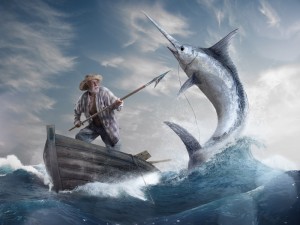Our second book of the semester is Mike’s choice: Ernest Hemingway: The Old Man and the Sea. I have to say: Hemingway is the kind of author I think of as another “man’s” writer.  Like Steinbeck, it’s all externals, action, physical details. This is another book I’m going to be suffering through. I hope everyone else enjoys it enough to make my pain worthwhile.
Like Steinbeck, it’s all externals, action, physical details. This is another book I’m going to be suffering through. I hope everyone else enjoys it enough to make my pain worthwhile.
Last summer, I read a book by Edith Wharton, a nineteenth century American writer, called The Reef. Towards the end of this novel, the female protagonist, Anna Leath, begins to realize that she has highly ambivalent feelings about the man she’s engaged to, whom, she’s just discovered, has had an affair with the family’s governess. Of Anna, Wharton writes:
“She recalled having read somewhere that in ancient Rome the slaves were not allowed to wear a distinctive dress lest they should recognize each other and learn their numbers and their power. So, in herself, she discerned for the first time instincts and desires, which, mute and unmarked, had gone to and fro in the dim passages of her mind, and now hailed each other with a cry of mutiny.”
I remember, when I read this passage, being so moved and impressed by it because it’s a perfect example of exactly the kind of thing I look for and love in a fiction writer – the ability to capture and express those psychological moments that are central to human life and relationships.
This may sound like a roundabout way of why I don’t like Hemingway and Steinbeck, but in fact I’m working very hard as I read to understand why this kind of writing does so little for me, and why I find it so empty.
In our discussion last week, Josh said, “men are visual creatures.” It’s certainly true that, in general, men respond to visual stimulation more readily than do women. The men in the group may enjoy this book because it’s so visual, and the characters so elemental, the story so simple and mythic: man and boy versus the elements. I’m not a visual person, however. What I look for is psychological insight and unexpected language, and this book has neither. Nor did the last one. Again, I’m not saying there’s anything wrong with the book – it just doesn’t have what it takes to get me going. There’s an old man, and there’s a big fish. But it’s not enough. Moby Dick, another story of an old man and a big fish, is much more interesting to me because there’s a lot of psychology involved (and some interesting secondary characters). But here, there’s just a man and a fish. And I’m not hooked.
